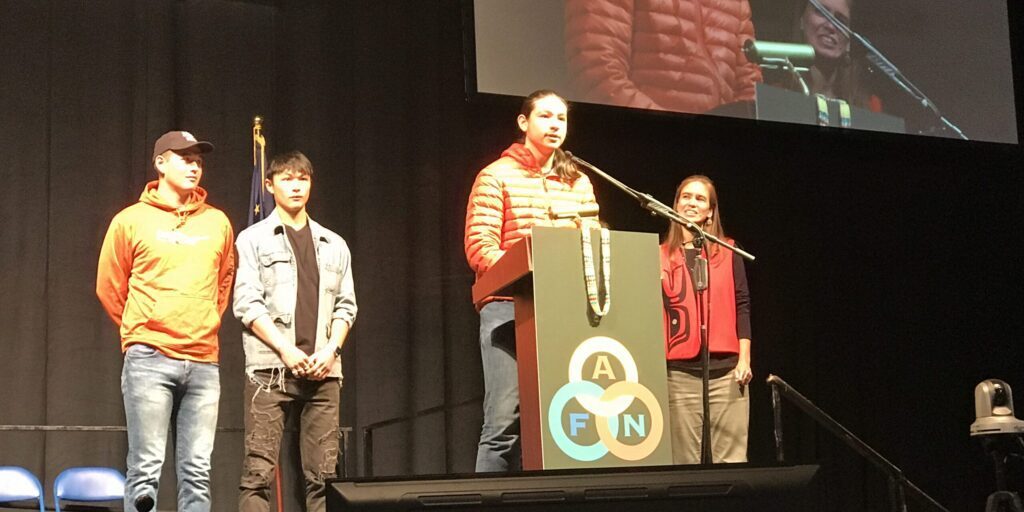Addressing the widespread use of violence against Alaska Native women was one of the dominating topics at the 2019 Alaska Federation of Natives convention. While, the call for men to step up and do better for women echoed throughout AFN, from elders up to Senator Dan Sullivan, a group of young men at the Elder’s and Youth conference were already having that conversation. A few days later at AFN, KNOM’s Emily Hofstaedter spoke with some participants who shared what they learned during an Elder’s and Youth men’s talking circle:
The Elders and Youth Conference , put on by the First Alaskans Institute, can be a time for learning new cultural activities and having new conversations. For some young men, like Oliver Hoogendorn of Nome, that meant talking about sexual assault for the first time.
“It seems like Native men are just taught to hold it in, so they don’t really talk that much so they’re starting to bring it out a lot more. Bring it up as a topic, just to get comfortable talking about it, I think.”
The theme for this year’s main AFN conference was “good government, Alaska driven” and in this young men’s circle that meant good government of yourself. The young men shared ways to cope with their feelings and control themselves, which Wilson Hoogendorn says can help them prevent assault in the first place.
“We talked a lot about how to handle your anger, maybe ways to deal with stress other than just reacting.”
The Hoogendorn brothers described a circle with an elder in the middle using a microphone to guide talking points. There were only about twenty chairs put out initially, Wilson thinks, but he says the circle grew to include roughly 150 young men.
For elder George Edwardson of Utqiagvik, this year was the first time he led a talking circle at Elders and Youth. He’s the president of the North’s regional tribal government, Inupiat Community of the Arctic Slope (ICAS), and he wants youth to step up and be leaders to take over jobs like his. He says people, especially men, need to talk about being hurt.
“They’ve got to learn to let everybody know what somebody did. Don’t be bashful. Stand up.”
He says that includes speaking up when someone important to them, even a respected elder, is the abuser. Edwardson thinks communities are safer when men embrace who they are. And that means embracing their culture too.
“Don’t be afraid to use your name, your Native name. That allows you more courage than you usually have using your English name.”
Henrik “Nuġasaq” Brandt also participated in the men’s talking circle. He has his own ideas of how to re-connect men with their culture to prevent violence. He explained that on King Island they used to have “kaġzri”, men’s groups that discussed philosophy and math. Brandt says they also worked on emotional control.
“Not really like a robot, control your emotions, but enough to where you wouldn’t act out in bad ways.”
Brandt says he’s been trying to get a kaġzri started back in Nome and although the progress has been a little slow, he is hopeful it will get going. He thinks that young people connected to their culture have a part in helping the state of public safety in Alaska.
Wilson Hoogendorn echoed that sentiment too.
“There’s so many Natives. I feel like Natives have power here. It’s kind of cool.”
The 2019 theme for the Elders and Youth Conference was “Qanerayaput Yugtun Piniqerput” (Yup’ik) and “Qanerayaput Cugtun Kayuqerput” (Cup’ik), which First Alaskans translates to “Language is Our Superpower”.
Image at top: Henrik Brandt of Nome addresses AFN with a summary from Elders and Youth Conference. Wilson and Oliver Hoogendorn stand in the background. Photo by Emily Hofstaedter, KNOM (2019).




